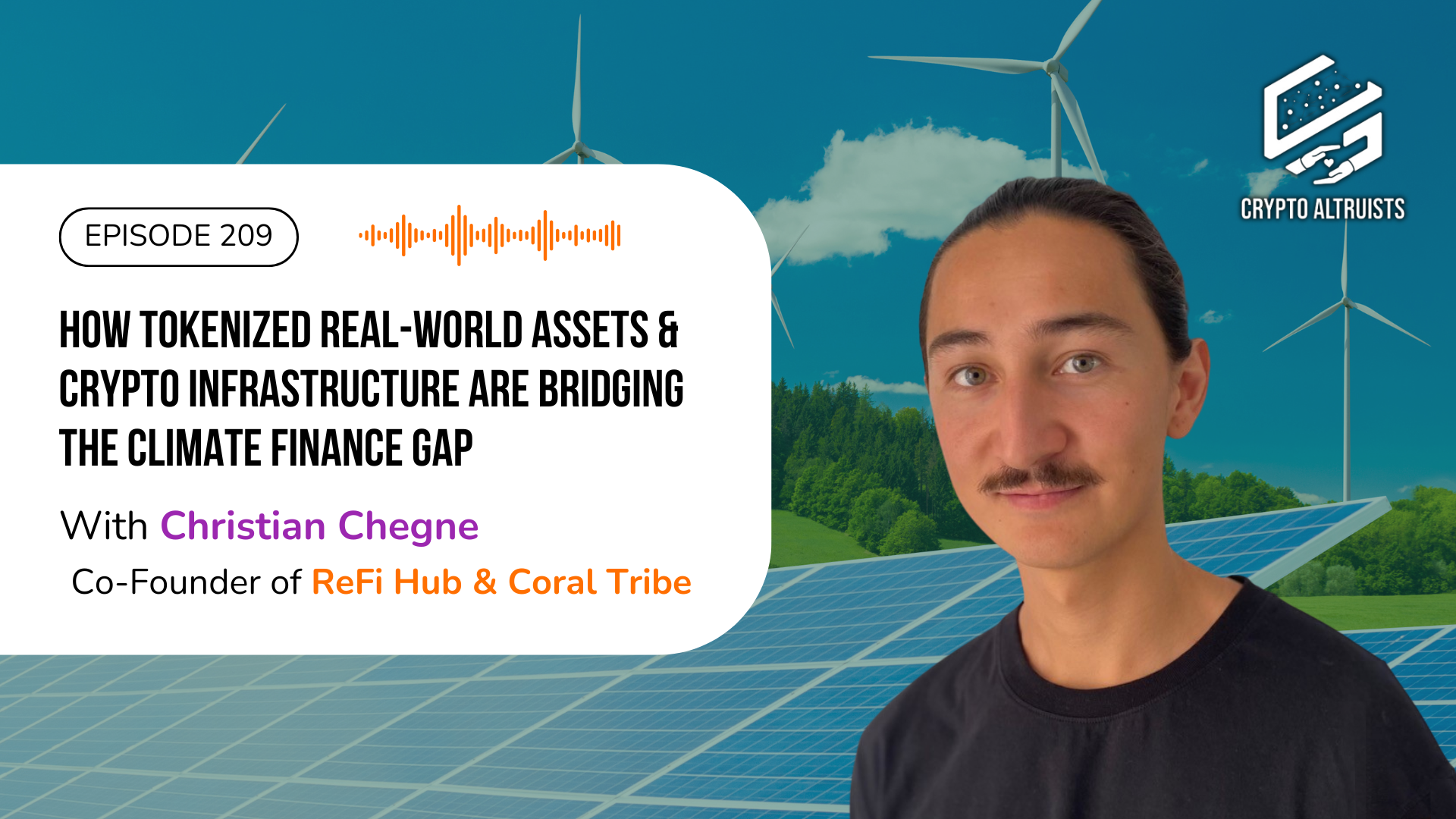
Today we welcome Christian Chegne, Co-Founder of ReFi Hub, a rapidly growing regenerative finance platform that lets anyone invest in real-world sustainability infrastructure, from solar plants to EV charging stations, and earn on-chain yields while supporting climate-positive outcomes.
Their model is simple but powerful: tokenize real-world revenue-generating projects, let users invest with USDC, and transparently track both financial returns and climate impact. The result? Three sold-out investment rounds, growing user momentum, and a strong case for why blockchain and climate action go hand in hand.
This episode is a deep dive into how tokenized real-world climate assets are reshaping sustainable investing, and why the next wave of climate finance might just be powered by Web3.
You’ll learn:
🔍 Transparency, Trust, and Fractional Ownership Through Blockchain: While clean energy investment platforms exist in Web2, blockchain unlocks critical advantages, bringing transparency through on-chain data, enabling direct investor-to-asset relationships via smart contracts, and allowing fractional ownership through tokenization.
🏘️ Democratizing Climate Investment for Local Communities: Small and medium-sized businesses often struggle to access climate finance. ReFi Hub is changing that by opening up funding channels typically reserved for large corporations, making clean energy more accessible, local, and community-driven.
🎮 Gamifying Regenerative Finance with ReFi Elements: Through the ReFi Elements initiative, ReFi Hub is leveraging Web3-native incentives to drive engagement and impact. Gamified “badges” and rewards turn investing in sustainability into an interactive, community-powered movement.
🌐 Why Solana...And Why the Future Is Multichain: ReFi Hub chose Solana for its low fees, energy efficiency, strong community, and grant support, but Christian believes that regenerative finance is a multichain future. The goal: make climate investments accessible wherever users are.

PIPE gDAO is leveraging blockchain for their University Real World Asset IP Launchpad that helps bring groundbreaking ideas from lab to market. By joining the Pipe Associate Network (aka PAN), associates can create a profile highlighting their skills, be notified of opportunities, and then contribute fractional work to pre-IPO companies in return for equity and tokens.
Check out their Linktree for links to all of their socials so you can get involved and join this growing community!
02:20 - Welcome back to the Crypto Altruists podcast for the third time! For our newer listeners, let’s kick things off with your journey. Tell me about your journey to Web3 and what first inspired you to co-found ReFi Hub.
05:05 - Can you give a high level overview of the mission of ReFi Hub?
06:20 - You just launched your third climate infrastructure investment—EV charging stations in Brazil—and it sold out in just two hours. Can you walk us through what happened and what you learned from this milestone?
09:20 - Across the solar, EV charging, and upcoming sustainable BTC mining projects, what’s your framework for evaluating which impact assets to tokenize next?
12:25 - How does ReFi Hub leverage blockchain to increase transparency, traceability, and trust in the climate investment process? What can blockchain do here that traditional finance can’t?
16:00 - There’s a huge gap in climate finance—trillions are needed, yet access remains limited. How can ReFi Hub and tokenized real-world assets help close that gap?
19:55 - A big part of your approach is not just investment, but community. Tell us about ReFiHub Elements and how it’s helping coordinate climate action through gamification and participation.
23:15 - You’ve chosen to build on Solana. What made Solana the right fit for ReFi Hub, and how do you see its ecosystem evolving as a home for regenerative finance?
32:20 - For first-time users, what does the ReFi Hub experience look like? How do you make regenerative finance approachable to everyday investors?
35:10 - Let’s talk risk. What mechanisms—like collateralization, impact verification, or legal safeguards—are in place to protect investors and ensure real-world impact?
40:15 - What’s your call to action for our listeners? How can they get involved and learn more, whether by investing, joining the community, or spreading the word?
41:50 - What advice would you give to other founders building regenerative projects at the intersection of Web3 and climate? Any hard-earned lessons you’d like to share?
48:00 - When you zoom out and think about the future of regenerative finance—what kind of world are you ultimately hoping to help build? What keeps you motivated to keep pushing forward, even when the path is uncertain?
Please note: we make use of affiliate marketing to provide readers with referrals to relevant products and services.
Support thoughtful, independent crypto journalism and help us continue highlighting blockchain’s potential for social and environmental impact.
cryptoaltruists.eth
While we may discuss specific web3 projects or cryptocurrencies on this podcast, please do not take any of this as investment advice, and please make sure to do your own research on potential investment opportunities, or any opportunity. We host a variety of guests on this podcast with the sole purpose of highlighting the social impact use cases of this technology. That being said, Crypto Altruism does not endorse any of these projects, and we recognize that, since this is an emerging sector, some may be operating in regulatory grey areas, and as such, we cannot confirm their legality in the jurisdictions in which they operate, especially as it pertains to decentralized finance protocols. So, before getting involved with any project, it’s important that you do your own research and confirm the legality of the project. More available HERE.